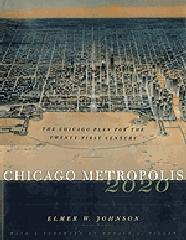In the late nineteenth century, Chicago was a commercial colossus, a city growing more quickly than New York, flooded with industrial money and brassy confidence but ravaged by great income disparities, dangerously lax health standards, and labor upheavals. For Chicago to become the city it could be, civic leaders recognized the need for order and planning, both to solve Chicago's problems and to prepare it for a prosperous future. The result was architect Daniel Burnham's 1909 plan for Chicago, a model of urban planning, aesthetic sophistication, and technical achievement.
Nearly a century later, Chicago, like all cities, faces similar dilemmas: how to reconcile privatism with public control, growth with restraint, wealth with poverty, and beauty with industry. And as it did a hundred years ago with the Burnham Plan, the Commercial Club has sponsored a wholly contemporary plan for the city's future development. Written by Elmer W. Johnson, a lawyer and civic leader, Chicago Metropolis 2020 is a guide for those in all spheres of influence who are working to make cities economically and socially vigorous while addressing the greatest problems modern metropolises face. While Burnham's plan primarily addressed architecture and spatial planning, Chicago Metropolis 2020 addresses all facets of urban life, from public education to suburban sprawl, from transportation to social and economic segregation, with the expressed goal of continuing Chicago's tradition of renewal and foresight.
Chicago Metropolis 2020 is an ambitious and necessary plan for a major city at the turn of the century. In scope and execution, it aims at nothing less than economic vibrancy, quality of life, and equity of opportunity.
"This supple plan, a set of informed suggestions, not a blueprint for an ideal city, promises to narrow economic inequities and right the social balance in Chicago while keeping it a capitalist powerhouse, a city energized by crisis, contention, and competition. It offers no easy answers, no sweeping panaceas. . . . But it is an inspiring guide for the new century, as people everywhere seek ways to build and maintain cities that retain their humanity without losing their energy."--From the Foreword by Donald L. Miller, author of City of the Century: The Epic of Chicago and the Making of America

(0 Comentarios)